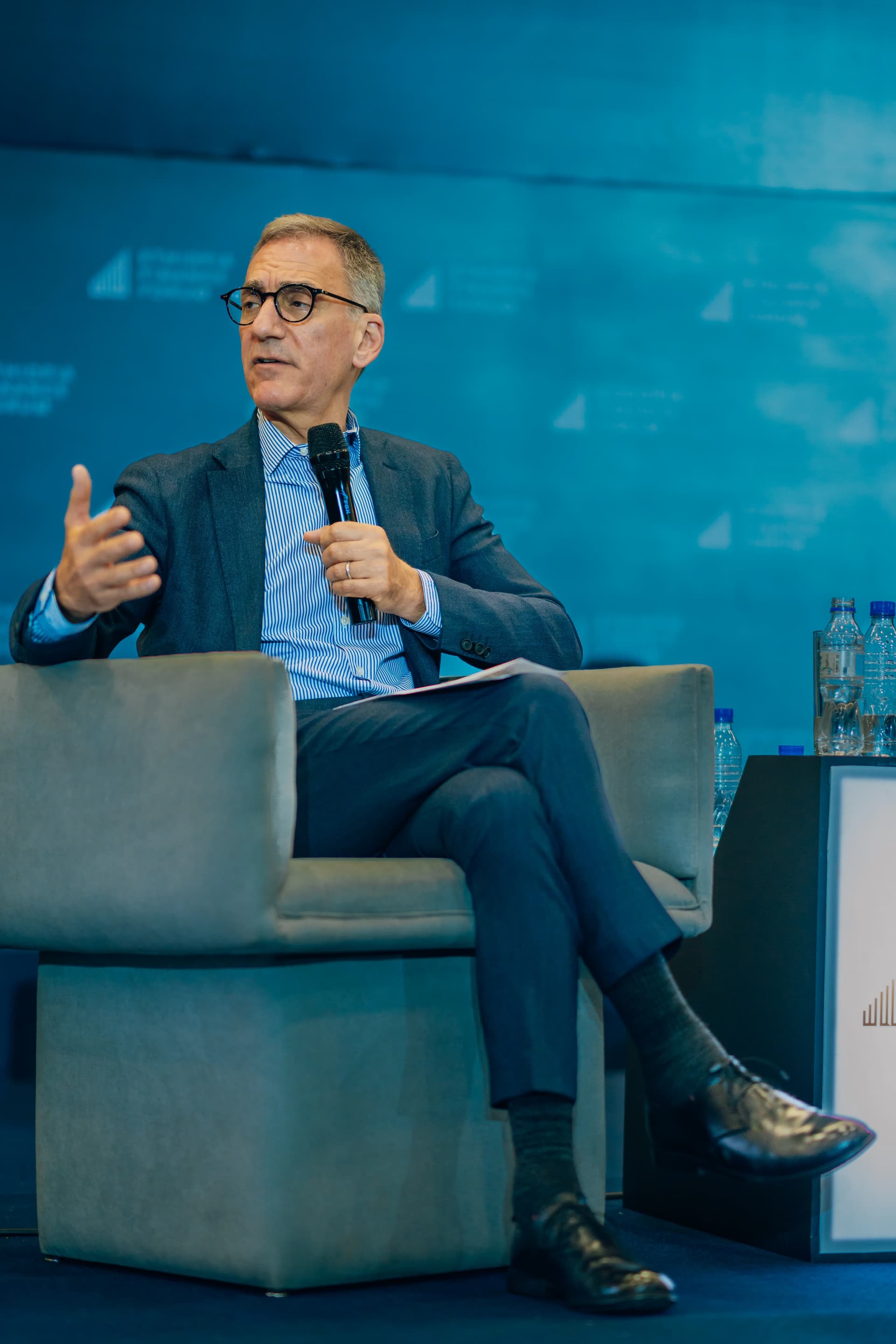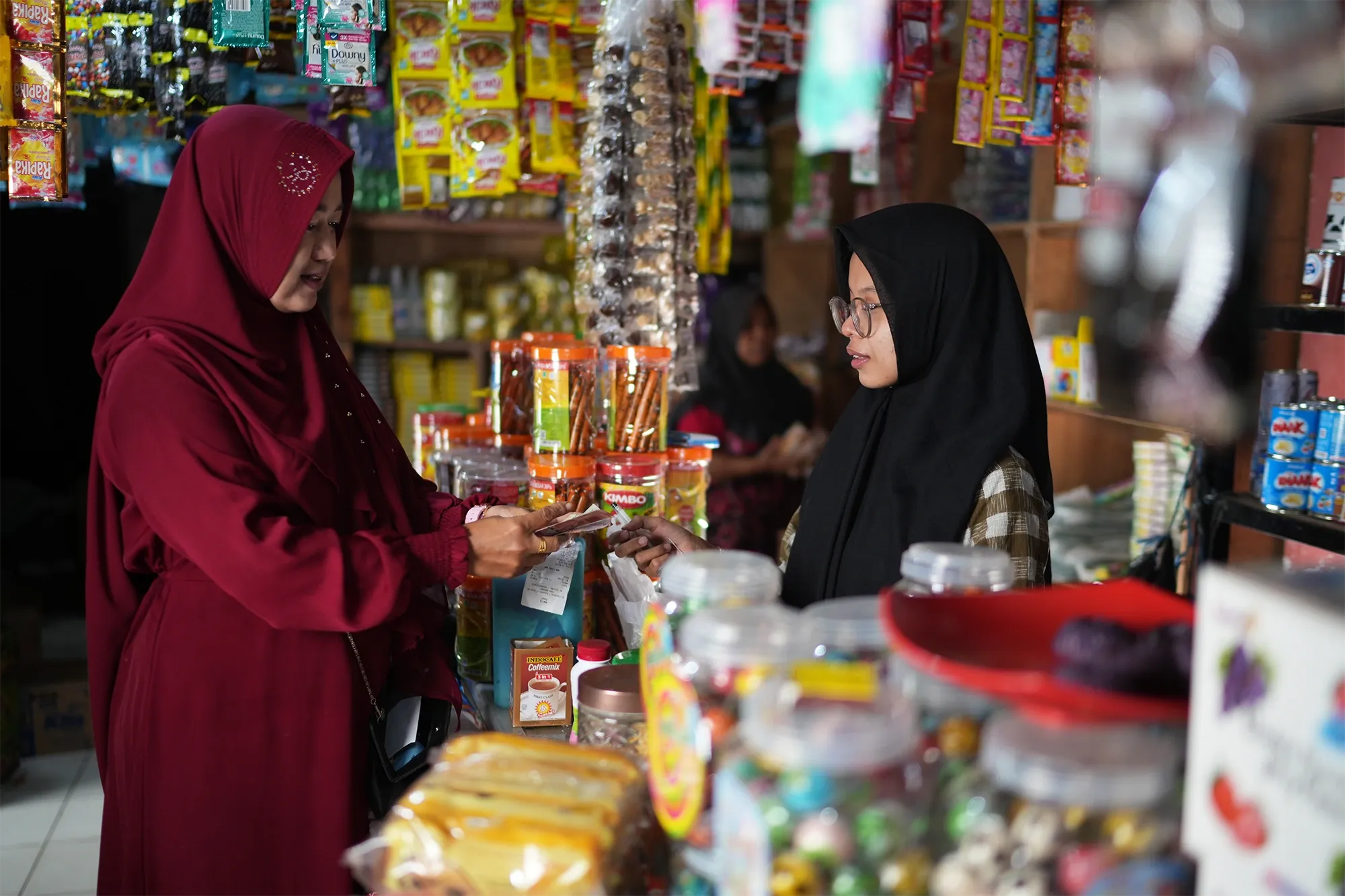Progress for 0 ad
Progress for 1 ad
Progress for 2 ad
Progress for 3 ad
Progress for 4 ad
Progress for 5 ad


Etenat Awol
Addis Ababa, Ethiopia

Before becoming Accion’s President and CEO sixteen years ago, Michael Schlein built a career spanning diverse institutions. From shaping policy in the New York City government to holding senior roles at Citigroup and the United States Securities and Exchange Commission.
Under his leadership, Accion a nonprofit founded in 1961 with a mission to bring financial tools to those often left out of the system, has become a major force in inclusive fintech investment, backing more than 267 financial service providers across 75 countries and reaching over 440 million people. The organization has helped launch several high-impact companies, including 7 unicorns, and has deep roots in Latin America, where it first grew to scale before expanding globally.
Now visiting Ethiopia for the second time, Michael returned to Addis Ababa to take part in the inaugural Ethiopia Finance Forum. During the visit, he sat down with Shega’s Etenat Awol to discuss Accion’s work in Ethiopia, its evolving strategy, the power of data and digital tools to drive financial inclusion, and what success could look like for Ethiopia on the global fintech stage.
Shega: Accion works across continents with several partners. Can you walk us through your model and how you operate globally?
Michael: Accion’s mission is to create a financially inclusive world, with a focus on the nearly 2 billion people who are excluded from the global financial system. We do this in several ways. First, we invest in early-stage fintech through our Accion Venture Lab and in more mature startups through Quona Capital. Second, we partner with existing banks and microfinance institutions to help them digitally transform and reach more underserved clients. While our advisors work on the ground in many countries, including Ethiopia, to help financial service providers innovate and scale. We also conduct research and advocacy to advance the field of financial inclusion, and in the U.S., we’re a direct lender to small businesses that have trouble accessing capital.
The rapid adoption of digital technology and mobile phones has created new opportunities to reach people who have long been excluded, and we’re working to leverage these trends to make financial services more accessible and impactful.
Shega: Accion is known for investing in early-stage fintech companies. Could you explain your approach to these investments and how initiatives like Accion Venture Lab and Quona Capital fit into your broader strategy?
Michael: We invest at the seed level through Accion Venture Lab, which focuses on startups that are just getting off the ground and have innovative ideas for serving the financially excluded. Quona Capital, which we helped launch, invests at the Series A and B stages in fintech companies with proven models that are ready to scale. Our approach is to support entrepreneurs who are using technology to solve real problems for underserved communities, whether it’s providing access to credit, insurance, savings, or payments. By supporting these companies early, we help them grow and reach millions of people who otherwise wouldn’t have access to formal financial services.
Shega: Beyond startups, Accion also works with established banks and microfinance institutions. What are the main challenges and opportunities in helping these institutions adopt new technologies?
Michael: The biggest challenge is often cultural. Many traditional institutions are used to doing things in a certain way, and digital transformation requires a shift in mindset. There’s also the challenge of building the right technology and data infrastructure. But the opportunity is enormous. By adopting digital tools, these institutions can reach clients in remote areas, reduce costs, and offer more tailored products. We help them experiment, learn, and scale what works, often using our balance sheet to share the risk.
Shega: Accion has worked across continents, each with its own challenges. As the world embraces digital finance and emerging tech, what do you see as the most urgent priority to ensure that financial inclusion remains genuinely inclusive?
Michael: This is a pivotal moment. Over the past several decades, global poverty has steadily declined. But that progress stalled during the pandemic and has been further eroded by inflation and supply chain disruptions. For the first time in decades, we’re not seeing any real progress in reducing poverty. So, our work is more urgent than ever.
On the other hand, we’ve also seen tremendous digital innovation. Even the poorest communities now often have access to mobile phones and increasingly, smartphones. The combination of stalled poverty reduction and unprecedented digital penetration makes this a moment of both crisis and opportunity. If we act now, we can truly build a financially inclusive world.
Shega: Accion has recently deepened its presence in Ethiopia, partnering with institutions like Dashen Bank. What motivated this move, and what are your key priorities in Ethiopia?
Michael: Ethiopia is incredibly exciting. Your central bank governor described it as "the last frontier, “a nation of 130 million people that’s only recently opening to the global economy. The government's vision, and the central bank’s execution of that vision is impressive.
We’ve formed several partnerships in the country. As you mentioned, we’re working with Dashen Bank to help them build an innovation hub and digitally transform. We're also working with Kifiya, which uses alternative data to reach populations previously considered unbankable. That program is supported by Jersey Overseas Aid.
Another priority is refugees. Ethiopia hosts over a million refugees, and bringing them, especially women, into the economy is a huge challenge and opportunity.
Shega: What is the scale of Accion’s investments globally, and how does that play out in Africa and Ethiopia specifically?
Michael: Historically, we’ve invested in or supported 267 financial service providers in 75 countries. These institutions now serve hundreds of millions of people who would otherwise be excluded.
We started in Latin America with microfinance and later expanded to Africa, India, China, the Philippines, Indonesia, Myanmar, and beyond. Over the past 12 years, we’ve focused on fintech, becoming an active investor at the seed, Series A, and B stages.
In Africa, we’ve worked across a dozen countries. Our focus remains on supporting both fintech and traditional institutions as they modernize and use digital tools to reach new populations. We also continue to invest in research and policy to drive systemic change.
Shega: How do you see microfinance evolving with emerging technologies like AI, especially in underserved regions like Sub-Saharan Africa?
Michael: We're living through a digital revolution. Think about how your own life has changed through your phone. That same technology and the data it enables,is finally letting us see people whom banks couldn’t “see” before.
Take Pula, for example. It started in Kenya and now operates in 20 African countries, including Ethiopia. They use satellite data now high quality and affordable to monitor conditions for smallholder farmers. They can track droughts, floods, soil quality, and more. For the first time, they can insure a remote, one-acre family farm.
In the past, small transactions and geographic distance made serving these clients commercially unviable. Not anymore. With AI and data analytics, we can reach people remotely, personalize products, and make real-time decisions.
Let me give you another example. There's a company called Field Intelligence. It started out in Kenya and has since expanded to Nigeria. They're focused on reducing the cost of the medical supply chain across Africa. At its core, they're a logistics company that works with small, mom-and-pop pharmacies. They use artificial intelligence to tell the pharmacy owner what she should put on her shelves.
Now, think about it: for a small pharmacy, what she stocks is everything. If she has the wrong drugs, people get sick. If she has too much of something, she ends up throwing away expired medicine and with it, her profits. So predictive analytics that tell her exactly what to stock is critical to her success.
Field can make that investment in analytics something she could never do on her own. And now, Field has a network of thousands of small pharmacies. That gives them visibility into trends she could never see by herself. They deliver, supply, provide tools to help her run her business, and even offer credit.
Now think about the data they have access to: they can see exactly what she’s selling, when she’s selling it. That’s data no traditional bank has ever had. So, while banks look at her and say, “She’s risky,” Field looks at her and says, “I know exactly how she operates.” That’s the power of data; it makes the invisible visible. And that’s what’s so exciting. It’s the revolution we’re living in. Data, by its nature, is inclusive.
Shega: What potential do you see in applying AI to financial inclusion?
Michael: Well, we’re really excited about what’s possible, even though it’s still early days. There are three main things to watch: First, automation-like in Indonesia, where the financial regulator uses generative AI to handle fraud complaints instantly, speeding up responses and spotting fraud by location and industry in real time. Second, tailored advice-imagine a small farmer in rural Ethiopia getting real-time crop tips, weather updates, and market prices in her own language, all thanks to generative AI.
And third, using alternative and unstructured data beyond traditional credit scoring which relies on past loan repayment and collateral. But we’re now using everything from utility payments to Yelp-style reviews to assess creditworthiness. This is critical because poor people often don’t have bad credit histories; they have no credit history. They've been invisible. But now, we can finally see them.
Shega: You’ve previously described India as the epicenter of financial inclusion innovation. How do you see Ethiopia’s potential in this space?
Michael: Yes, I’ve actually discussed this with your central bank governor. Globally, India and Brazil lead in building digital public infrastructure universal biometric IDs, real-time payments, open banking all supported by strong regulatory frameworks.
I believe Ethiopia has a similar vision and is already executing on it. Launching the digital public infrastructure is a big step, and I think Ethiopia could become a model for the continent. That’s what makes this moment and this forum incredibly exciting.

Shega: In rural areas like much of Ethiopia, trust, literacy, and the digital divide remain barriers and innovation can sometimes outpace inclusion. How does Accion ensure innovation doesn’t leave people behind?
Michael: That’s the heart of our mission: ensuring innovation doesn’t exclude. Financial tools can be complex. So, we have extensive financial education curricula and increasingly embed consumer protection into the design of products making them intuitive, like your phone, which you likely never needed a manual for.
It’s also about building trust. Moving from cash to digital is scary. People ask: How do I use it? What can I buy with it? That’s why handholding and education are so important. While devastating, the pandemic accelerated digital adoption globally even among the world’s poor. People learned how to use phones out of necessity, and that momentum is helping now.
Shega: And what about algorithmic bias? How do you ensure data-driven models don’t deepen inequality, particularly for women?
Michael: Important question. We’re very aware of this. Our think tank, the Center for Financial Inclusion, published a study on bias in algorithmic lending. Let me give you one example: many models use phone charging or top-up behavior as a proxy for creditworthiness. If you top up before running out, you're seen as responsible. But in many households, women share phones or get the family’s old one which means their phones are more likely to run out of power or credit. That leads to algorithms systematically disadvantaging women. We need to understand these biases and build better models.
Shega: You’ve led Accion through a remarkable period of financial transformation. Personally, what keeps you inspired and grounded in the work, especially during such rapid change?
Michael: Honestly, the mission is what keeps me grounded. The pace of change is incredible, even just here in Ethiopia. Globally, we’re living in a chaotic, volatile time. But the mission gives us focus. It keeps us anchored. This is an urgent moment. The need for what we’re doing, financial inclusion, has never been greater. At the same time, the tools we now have at our disposal are more powerful than ever. So, we try to stay focused on the mission and not get distracted by the noise.
Shega: From shaping policy in NYC government to leading Public Affairs at Citibank, and now heading Accion, you’ve had a remarkable career journey. How has shifting from profit-driven to mission-driven work shaped your view of finance and its purpose?
Micheal: Public service has always mattered to me. I think people who go into government genuinely want to make the world better. I then spent many years in financial services on Wall Street and in investment banking, and I saw how powerful finance can be. It opens doors for people: through savings, credit, insurance, or even just fast, reliable payments.
Accion lets me bring both of those worlds together. We harness financial tools to improve people’s lives. Working in government is different from the private sector, and both are different from the nonprofit space, but I’ve drawn from all those experiences in service of this mission.
Shega: If we fast forward to 2030, what does success look like for Accion and for you personally? And what role do you hope Ethiopia plays in that future?
Michael: When we talk about financial inclusion, most of the attention goes to India and Brazil. My dream is that we’ll have a similarly powerful example here in Africa. And I would love for that to be Ethiopia.
Shega: In your experience, what do people often get wrong about financial inclusion and innovation?
Michael: Great question. I think one big misconception is that poor people are financially unsophisticated. In fact, many clients I’ve met around the world are incredibly savvy often more so than I am. They have to be.
I remember meeting a woman in Brazil who traveled hours each day to buy materials, then made dresses to sell so she could afford milk and food for her kids. We gave her a $300 loan that allowed her to buy two weeks’ worth of material at once. That freed up half her day for productive work. She made more dresses and even started selling materials to other women. That one loan transformed her life.
We take for granted that we have tools to make our financial lives easier: mobile banking, debit cards, ATMs, and monthly salaries that match monthly bills. But for over two billion people, those tools don’t exist.
A woman farmer living in poverty may get paid once or twice a year at harvest. She has to stretch that income across the entire year, and she doesn’t even have a safe place to save her money. She’s hiding it under her mattress. She lives in a region vulnerable to floods and droughts, yet no one will sell her insurance.
Shega: What gives you the deepest hope right now?
Michael: The pace of innovation. It’s extraordinary. But even more than that, what gives me hope is the next generation. I speak to a lot of business school students. Today, many of them want to be social entrepreneurs. They want to build businesses that help people. That language didn’t even exist when I was in school.
It turns out Accion has been doing social entrepreneurship and impact investing for decades before we had the words for it. Now, it’s mainstream. That gives me great hope for the future.
Shega: What worries you most?
Michael: With every new technology, there’s enormous potential but also significant risk. We have to be thoughtful. Generative AI, for example, is accelerating the digital revolution. It can help us reach billions of people who’ve been excluded. But it can also be used for fraud. Not everyone will be comfortable in a digital world. So, we have to be smart. We must work to maximize the positives and minimize the negatives. That’s the only way to ensure this revolution is truly inclusive.
Shega: Final thoughts?
Michael: Just this: we are in a moment of incredible urgency. Accion is an amazing organization, but we need to keep reminding ourselves of the stakes. What we’re doing has always been important, but it’s especially important now given the chaos in the world and the potential of new tools. We need to stay focused on the people we serve and tune out the noise.
👏
😂
❤️
😲
😠

Etenat Awol
Etenat holds a degree in Journalism and her master's in Public Relations. Previously, she served as a university lecturer and has five years of experience in communications, media, digital marketing, and consulting.
Your Email Address Will Not Be Published. Required Fields Are Marked *